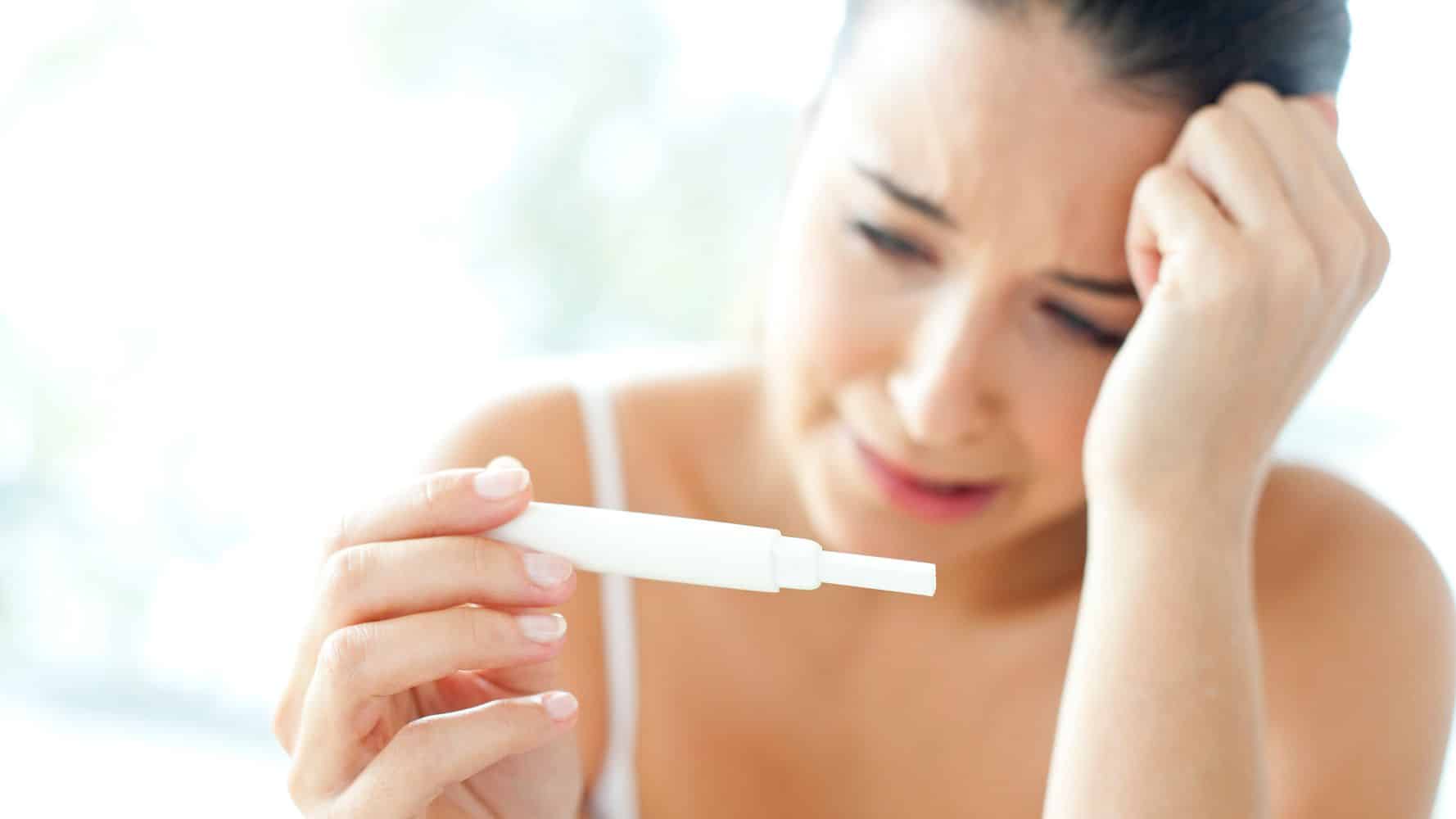What is female infertility? What causes this condition?

Let’s first explain infertility briefly.
Infertility is defined as the failure to become pregnant for at least one year (with routine unprotected sexual intercourse). Before we discuss further, we encourage you to read till the end to discover the best natural treatment that will help you overcome most female infertility diseases you might be facing.
Infertility itself can occur in men or women. Where about a third of difficult cases of pregnancy are usually caused by female infertility, while the rest are due to male factor infertility or unknown causes.
Table of Contents
Hence, Female infertility occurs when the ability of a woman to get pregnant and give birth to a child is impaired or limited in some way. This can be as a result of several reproductive diseases like endometriosis, blocked fallopian tube, salpingitis, etc… which blocks the free passage of the sperm to the fallopian tubes where it is fertilized.
WHAT ARE THE CAUSES OF INFERTILITY IN WOMEN?
There are a number of things that may be keeping you from getting pregnant:
- Damage to your fallopian tubes. These structures carry eggs from your ovaries, which produce eggs, to the uterus, where the baby develops. They can get damaged when scars form after pelvic infections, endometriosis, and pelvic surgery. That can prevent sperm from reaching an egg in the tube. The egg and sperm meet in the tube. This is where the egg is fertilized and then moves down to the uterus to implant
- Hormonal problems. You may not be getting pregnant because your body isn’t going through the usual hormone changes that lead to the release of an egg from the ovary and the thickening of the lining of the uterus.
- Cervical issues. Some women have a condition that prevents sperm from passing through the cervical canal.
- Uterine trouble. You may have polyps and fibroid that interfere with getting pregnant. Uterine polyps occur when too many cells grow in the endometrium, the lining of the uterus. Fibroid grows in the wall of the uterus. Other abnormalities of the uterus can also interfere,
-
“Unexplained” infertility. For about 20% of couples who have infertility problems, the exact causes are never identified.
DO YOU WANT TO BOOST YOU FERTILITY NATURALLY?
GET PREGNANT NATURALLY IN THREE MONTH WITH THIS HERBAL COMPILATION
Our herbal solution for infertility is a combination of three bell lifestyle herbal products;
- Fertalin,
- PMS combo and,
- Supreme Immune Booster
Body Renewal For Women and Men (Fertalin) offers new hope for Couples! A natural infertility therapeutic from Bell Lifestyles that is made with amines found also in such plant foods as oats, cucumbers, radishes, as well as all cells in the human body. A naturally-based, non-hormonal product anecdotally proven to enhance both sperm count and quality in men, Body Renewal from Bell Lifestyles also helps to reduce the pain and inflammation associated with endometriosis, one of the most common causes of female infertility.
Click here to find out more about this natural treatment to boost female infertility.
Click here to discover Bell’s Natural Treatment Against Female Infertility

Infertility in Women, What are the Symptoms?
- Difficulty in getting pregnant. According to Harvard Health of Harvard Medical School, the main symptom of infertility is difficulty getting pregnant, at least after trying for 1 year for couples under 35 years old or 6 months for couples over 35 years.
2. Irregular Menstruation or No Menstruation

“Menstrual cycles that come sporadically indicate an underlying disorder related to ovulation, which can make conception more difficult,” says Dr. Sheeva Talebian, a reproductive endocrinologist at Reproductive Medicine Associates of New York, was quoted as saying on the Parents’ magazine website.
“(The cause) polycystic ovary syndrome (PCOS), thyroid disorders and hypothalamic amenorrhea. Where the brain hormone delivery signal is inactive. An irregular cycle can also be a sign of reduced ovarian reserve caused by endometriosis or early ovarian failure. ”
While not menstruating at all indicates that a woman is not ovulating and has very little chance of conceiving naturally.
3. Bleeding Between Two Menstrual Cycles

Frequent bleeding outside the menstrual cycle should also be suspected as a symptom of infertility in women. Why is that?
“Bleeding between your menstrual cycles or after sex could indicate uterine polyps or fibroid, or cervical lesions,” says Dr. Taliban.
It can even be a symptom of a more serious medical condition such as cancer, although this is rare.
4. Menstruation that is long, with heavy bleeding, or painful

Quoting Medical News Today, women who experience very painful periods with heavy bleeding may experience endometriosis. As is well known, endometriosis is a risk factor for infertility in women.
Other symptoms of endometriosis include:
- Chronic pelvic pain (not just during menstruation)
- Pain during sexual intercourse
- Back pain
- Fatigue
- Irregular menstruation
- Bleeding outside the menstrual cycle
- Pain when defecating
In addition, menstrual blood that is very dark at the beginning of your period can also be another symptom of endometriosis.
5. Often Experiencing Pelvic Pain

Not only is it a sign of endometriosis, chronic pelvic pain can also be a symptom of another medical condition that is also a risk factor for infertility, namely fibroid.
“ Fibroids are benign tumors in the uterus that can sometimes reduce fertility. However, fibroid are often painless, so you may not know you have them, “says Nicole Noyes, MD, head of the Department of Reproductive Endocrinology and Infertility at Northwell Health, as quoted from the website The Well by Northwell.
6. Obesity

Based on a study published in 2018 in the journal Reproductive Biology and Endocrinology, obesity has been shown to negatively impact reproductive health.
The researchers found that obese women had a lower chance of getting pregnant and had a higher risk of developing problems during pregnancy, compared to those who had no weight problems.
So, those are some symptoms of infertility in women. Tell your doctor right away if you may experience one of them.
What can increase the risk of infertility?
There are certain health and lifestyle factors that can increase your chances of having fertility problems. For example:
- Be over 35 years of age.
- Being very overweight or too thin.
- Chemotherapy or radiation therapy.
- A lot of exposure to environmental toxins, such as lead or pesticides.
- Excessive use of alcohol or drugs.
- Smoke tobacco.
- Failure to perform recommended tests for chlamydia and gonorrhea.
- History of pelvic inflammatory disease (PID).
DIAGNOSIS OF FEMALE INFERTILITY
Consult your doctor if you are concerned about your fertility. If possible, it is a good idea to go with your partner. Your doctor may ask you how long you have been trying to have a baby and if you have had any problems having sex. You could ask them about their lifestyle and also about their medical history, for example:
- whether or not you have been pregnant, or had an abortion or miscarriage in the past
- questions about your menstrual cycle
- if they have suffered from a sexually transmitted infection, long-term serious illnesses or other conditions that can affect fertility
- if they take any medication
Your doctor may also need to examine them.
Your doctor may recommend that you have unprotected sex two to three times a week for a year before having any tests. After that time, or sooner if your doctor thinks that you or your partner might have a condition that means you are less likely to conceive, there are numerous tests that you can undergo.
Your doctor may do blood tests to look at the levels of certain hormones. These can give information about how your ovaries work and whether they make eggs. Your doctor may also suggest a test to see if you have chlamydia infection. If necessary, your doctor will refer you to a fertility specialist or gynecologist (a doctor who specializes in women’s reproductive health).
If you have not previously been diagnosed with a disorder that may affect your fallopian tubes, such as endometriosis, you may be given a test called a hysterosalpingogram. It can show if your fallopian tubes are blocked. Hysterosalpingography uses a type of X-ray procedure called fluoroscopy. This involves injecting a dye (contrast medium) that is seen on X-rays into your uterus and fallopian tubes, as well as taking a series of X-rays that are displayed on a television screen. If your tubes are clear, the dye will fill them in and spread into them.
An alternative to hysterosalpingography is hysterocontrast sonography. It uses ultrasound, rather than x-ray, to examine your fallopian tubes.
If you have a condition that affects your fertility, or your doctor thinks you might, you may have a test called a laparoscopy and dye. This is a surgical procedure that allows the doctor to view your fallopian tubes and other organs in this area. Generally, the laparoscopy and dye procedure can give your doctor more information than hysterosalpingography.
MEDICAL APPROACH TO FEMALE INFERTILITY
If your infertility is caused by an underlying condition, such as endometriosis, there may be specific treatments that increase your chances of getting pregnant. If your doctor cannot find a particular cause for your infertility, there are several options he may suggest.
Self-help
Having sex two to three times a week is considered to maximize your chances of getting pregnant. Your doctor may also suggest making certain lifestyle changes, such as quitting smoking and not drinking more than one or two units of alcohol once or twice a week. Losing excess weight or gaining a little more may also be recommended.
It is a good idea to take a folic acid supplement if you are trying to get pregnant. This can lower your baby’s risk of certain developmental problems. Your doctor may recommend that you get a rubella vaccine if you are at risk of getting sick. They may also check to see if you have had a cytology test in the last three years.
Medicines
If your infertility is the result of an ovulation problem, a drug such as clomiphene citrate may be prescribed. This has the potential to stimulate the production of eggs in your ovaries.
Surgery
You may be ordered to have surgery if tests show that you have endometriosis or if your fallopian tubes are damaged. However, surgery is not suitable for all women, so it is important to talk with your doctor about the best option for you.
Surgery may also be an option if you have adhesions (fibrous scar tissue) on your uterus, or to remove fibroids, especially if they penetrate the inner lining of your uterus.
Assisted conception
There are several techniques to help you conceive. They aim to bring a sperm closer to an egg. The three most important methods are:
- Intrauterine insemination
- in vitro fertilization
- intracytoplasmic sperm injection
OUR EXPERTS ADVICE ON HOW TO DEAL WITH FEMALE INFERTILITY
If you are having trouble getting pregnant, it can have psychological and emotional effects. Feeling stressed, whether it’s because of your problems conceiving, your job, or something else, could affect your relationship with your partner. This in turn could have an impact on your libido and how often you have sex, leading to more fertility problems.
Hence, be calm, happy, and expectant. Enjoy your partners’ company.
- Eat healthily.
- Do not overwork yourself.
- In case of any underlying condition speak to a doctor.
Click here to discover Bell’s Natural Treatment Against Female Infertility
For more details on how to take and get this treatment Call or Whatsapp us via
